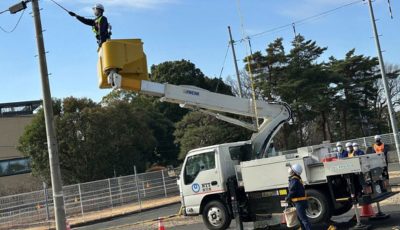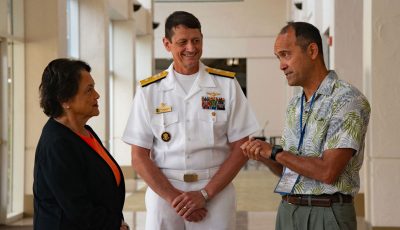‘Not being heard is no reason for silence’
Editor’s Note: The following is the text of Louis Zheng’s speech at the Attorney General Cup speech competition last May 4.
Victor Hugo, a famous French writer, once stated: “Not being heard is no reason for silence.” In a big group of people, there will always be those that will be unheard. In simple terms, if those unheard were you, it would not be illogical to feel that your voice does not matter. An enormous number of people living in United States territories, those outside the 48 contiguous states plus Alaska and Hawaii do not have the same rights. It is imperative to realize that not all Americans live in the 50 states. These are the people with American nationality who live in the United States territories such as Puerto Rico, Guam, American Samoa, and the Northern Mariana Islands. Our voices and input are not taken to account as highly as our fellow Americans in the mainland because we are seen as second-class citizens. This is all the more reason for us to fight—for the reason that we are unheard, that we are invisible, that we are not afforded the same rights afforded to all American citizens. We should fight the silence.
As one can see, I am against the rulings in the Insular Cases, a set of opinions formulated about over a hundred years ago by the U.S. Supreme Court. It covered the governmental issues of the territories that had just been acquired in the Spanish-American War. While scholars dispute on the total amount of insular cases that have occurred, the renowned Downes v. Bidwell case remains relevant. In short, it stated that the Constitution does not necessarily apply to the United States territories. The two major ideas that were disputed were to either govern the indigenous people or to simply leave them be. The political leaders and policy makers at the time believed that the “alien races” of the acquired territories would have a difficult time understanding “Anglo-Saxon principles.” This case in many ways shadowed the principles of “separate and equal” in Plessy v. Ferguson. Eventually, it was decided that an unincorporated government would be set up for the territories. This means that these territories (Guam, Puerto Rico, and Northern Mariana Islands) were not states but were part of the United States of America. Only “fundamental” rights would apply to the citizens and future citizens of these territories, such as property, unless stated otherwise.
Due to the limited rights of these territories, basic American rights such as voting for office in the general elections do not apply to us. Of course, the people of the territories are able to freely work in the mainland, but there are huge limitations for these people who were born on “American” soil. According Lana Birbrair, an expert in complex commercial litigation and employment disputes, “constitutional protections do not apply unless they are fundamental.” That is a scary notion. To think that constitutional protections do not apply to the citizens of these territories, territories that we live in. It does not stop at constitutional protections, once again restating, it goes as far as our ability to vote in the Presidential elections. Let this sink in: we are talking about American citizens who do not have the ability to vote for their own President. How absurd and unconstitutional. Why is it that some people in America—a nation of the people, by the people, for the people—are not able to vote for their leader? How is it that some Americans are still fighting for equal voting rights in 2018? This clearly displays the outdatedness of the Insular Cases. Again, this was a set of opinions made about 100 years ago. They were also made by politicians who had differing morals and perspectives than the people and politicians of today. It should be common sense that not everything can or should stand the test of time. Policies are one of them. This is where I would like to focus.
As I stated earlier, politicians believed that alien races would have a difficult time with Anglo-Saxon principles. Imagine that being said today. It would definitely be construed as a racist ideology. Politicians then thought it was the logical choice—a choice that would be deemed unacceptable today. Americans knew little about the newly acquired territories. At the time, it was the “sound” option. The question I would like to ask is what about now. Times have changed and the citizens of these territories are now more educated than ever before. We understand the political system, and we understand that change needs to happen. What makes us less “American” other than the color of our skin and the differences in our vernacular? Ethnically I am Chinese and I have Chinese blood coursing in my veins, but I was born and raised here in the NMI. Am I less American?
Here’s a fact. These territories have contributed to the United States in many ways. One way is the strategic significance of having islands in the Pacific as U.S. territories. Our islands are a way for the U.S. to have a placeholder in the Asia-Pacific region; we are essential to the geopolitics between the Asia-Pacific region and the U.S. Secondly, in which I especially would like to highlight, are the military contributions these territories made to fight in the War on Terror. Guam and many other U.S. territories have contributed a multitude of our young people into the battlefield for the protection of our nation. Some never to come back, some come back physically but are mentally still at war in the field. Patrick Flores, a young soldier from Guam, alongside his father, told about their harsh time in the war. They stated how their comrades were killed in suicide car bombings. They stated that during their entire time during deployment, they didn’t wear military uniforms that said “Guam’s Army” but rather uniforms branded as the U.S. Army. Patrick finally states that they are owed these voting rights. Owed indeed. Paul leti, a Samoan soldier deployed to Afghanistan, had a similar story. In fact, he shared his story on America’s Got Talent. It should be understood that these people are indeed true heroes. These are American heroes, American heroes who will not be offered American rights. It is truly ironic due to that fact they put their lives on the line as soldiers for their nation, but they are not able to vote for their commander in chief. We cannot let an outdated set of policies hinder that which are truly rights.
After all my research, I began to question myself, how American are these territories? We do not share the same rights as our brothers and sisters in the 50 states. The territories are bound to an outdated set of rules that can be easily changed if our federal government would put in the time and effort. This is American soil, this is America. We aren’t some separate nation that is simply under the influence of the United States. We are legitimate United States territories lacking constitutional rights. Four million people. Four million voices. Four million that will not remain silent until our voices will be heard. The basic fact is that the United States territories truly need our deserved rights. After all, is American soil without American rights truly American?



























